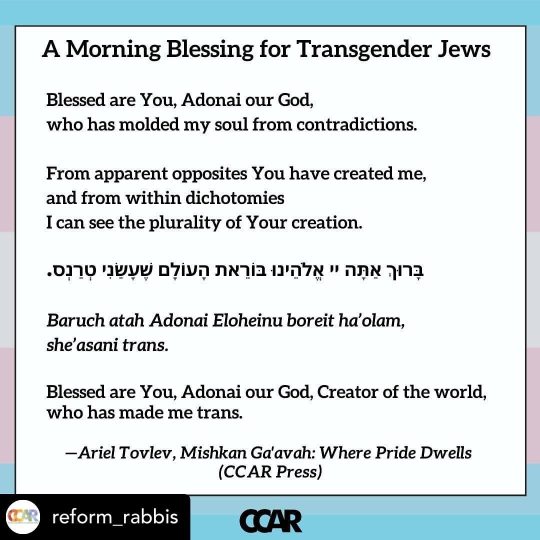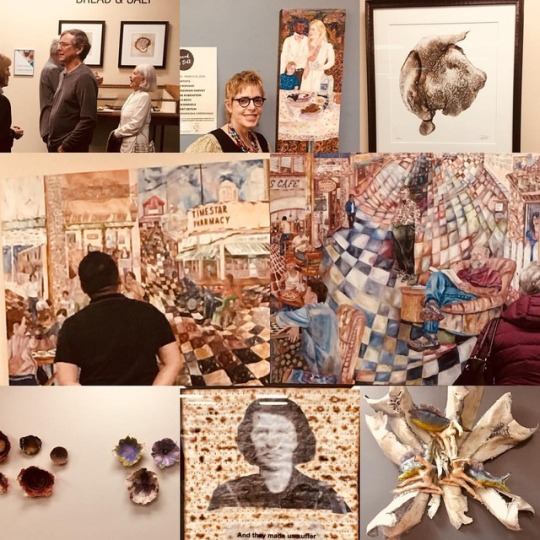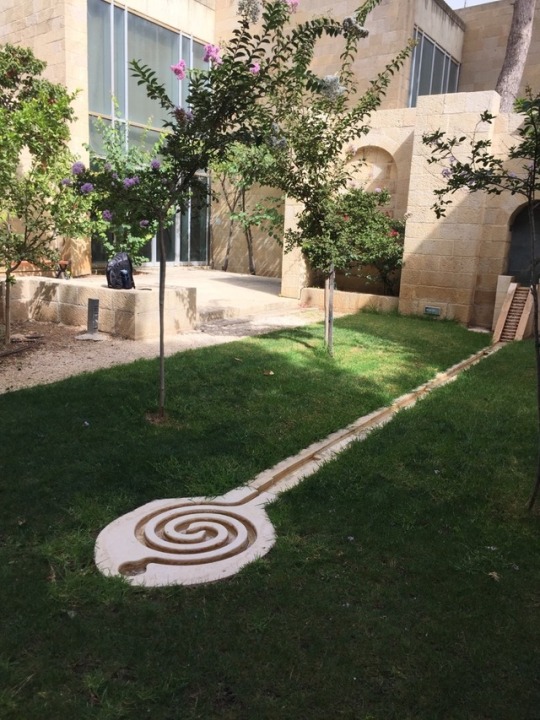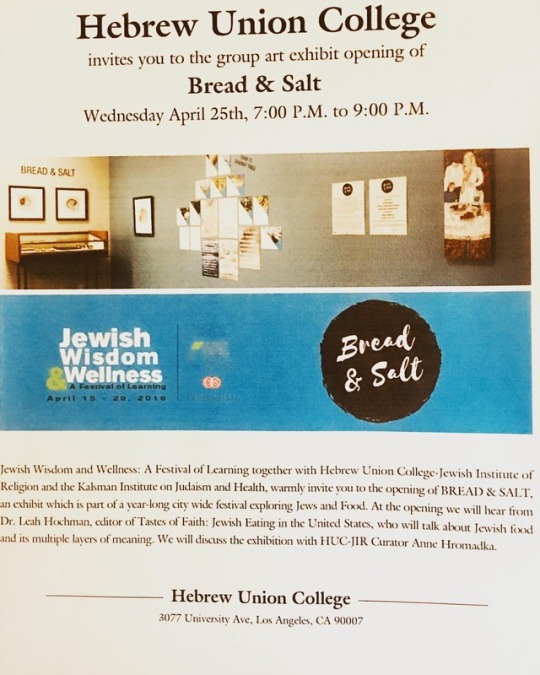#hucjir
Link
The Hebrew Union College - Jewish Institute of Religion lost our teacher, our friend, and our rabbi, Rabbi Aaron Panken, Ph.D. in a tragic plane accident yesterday.
In the last drash that he gave to his community at graduation on May 3, he presented us with the most profounding words, words that I hope we can all take comfort in on this very difficult time in the Jewish world and in our global community.
“Our celebration comes, this year, amidst a particularly challenging and painful world, one that in many respects transcends anything I have seen in my lifetime. We now live in a world in which truth is distorted, basic institutions of American life like the press, the courts, the electoral system, the FBI, the beautiful mosaic of immigration that made this country what it is, the dignity and value of public leadership and civil service, egalitarianism and a woman’s right to choose, and so many others, are threatened in ways we simply could not have imagined a mere two years ago. We see countries long civilized reverting to policies of nationalism and tactics of scapegoating reminiscent of our darkest times. We labor under the challenges of privacy and the ability for noxious leaders to spread their message ever more broadly and more efficiently through warped use of social media, cynical and often violent supremacist protests, and through targeting innocent immigrants as vicious criminals. But here’s the thing: the Jewish people, and our religious friends of other faiths, have seen this before, and we have lived through it, and thrived and built again and again and again. We are a people of action and courage, of innovation and fearlessness, of adaptation and endless creativity.”
“The work of our alumni continues to make an enormous difference in our world. When tragedy strikes, in Parkland and Houston, in the Caribbean and Charlottesville, in Los Angeles and Santa Rosa, our alumni are there. For Syrian and Iraqi immigrants, in congressional offices fighting for sensible gun safety, in hospitals and in classrooms, in innovative synagogues and new communities everywhere, our alumni are there. There is nothing in the world that makes me prouder, and nothing can make me more certain of the extraordinary Jewish future we have ahead of us, than knowing who they are and what they are doing, and seeing how they have produced the next generation of committed, learned Jews, through their hard work and their wisdom.”
#Rabbi Aaron Panken#Rabbi Dr Aaron Penken#Aaron Penken#Hebrew Union College#Hebrew Union College Jewish Institute of Religion#Reform Judaism#Judaism#Jewish#Jewish world#HUC-JIR#HUC JIR#HUCJIR#HUC#Progressive Judaism#ProgressiveJudaism#plane accident#reform rabbi#reform rabbis#cantors#jewish educators#tikkun olam#social action#social justice#jewish values#tradition#jewish tradition#religion#religious
39 notes
·
View notes
Photo

Posted @withregram • @reform_rabbis On #TransDayOfVisibility—and every day—we honor and welcome the trans members of the Jewish community with a blessing for transgender Jews, by @hucjir rabbinical student @arieltovlev in "Mishkan Ga'Avah: Where Pride Dwells A Celebration of LGBTQ Jewish Life and Ritual," by @rabbideniseeger . This groundbreaking CCAR Press collection of LGBTQ prayers, poems, liturgy, and rituals is both a spiritual resource and a celebratory affirmation of Jewish diversity. Order the book at http://pride.ccarpress.org. #TDOV2022 #wherepridedwells #ReformRabbis #ReformJudaism #Rabbi #JewishPrayer #Judaism https://www.instagram.com/p/CbxjitXu9xY/?utm_medium=tumblr
#transdayofvisibility#tdov2022#wherepridedwells#reformrabbis#reformjudaism#rabbi#jewishprayer#judaism
3 notes
·
View notes
Photo

“Bread & Salt” Six person #exhibition #curated by #hucjir #curator #annehromadka #citywideexhibition at numerous #jewish #cultural sites are each individually #curated #artists are: #jodibonassi #guensamuels #harrietzeitlin #aviroth #marleenerubenstein #georgiafreedmanharvey #jewsandfood (at Huc-Jir Los Angeles School of Education)
#guensamuels#georgiafreedmanharvey#curator#harrietzeitlin#jewish#hucjir#curated#annehromadka#aviroth#artists#exhibition#jodibonassi#marleenerubenstein#cultural#citywideexhibition#jewsandfood
0 notes
Text
RT @HUCJIR: The 2018 Roger E. Joseph Prize was presented to @FortifyRights at our New York Ordination on May 6. Read more about the work of this incredible organization: https://t.co/6sLn6tcQqP
The 2018 Roger E. Joseph Prize was presented to @FortifyRights at our New York Ordination on May 6. Read more about the work of this incredible organization: https://t.co/6sLn6tcQqP
— Hebrew Union College (@HUCJIR) May 17, 2018
from Twitter https://twitter.com/FortifyRights
0 notes
Link
#alden solovy#interfaith#muslim jewish dialogue#jewish muslim dialogue#jewish muslim solidarity#Muslim Jewish solidarity#muslimjewishrelations#JewishMuslimrelations#judaism#reform judaism#muslim#muslims#islam#hebrew union college#hebrew union college jewish institute of religion#huc#hucjir#huc jir#huc-jir#tefilla#prayer#ulpan#tefila#jerusalem#yerushalayim#yisrael#zionism#zionist#tzioni#palestinian
75 notes
·
View notes
Link
#rabbis#rabbiniate#reform rabbis#Israel Reform Movement#reform judaism#reform judaism in israel#rabbinical school#new rabbis#rabbi#reform rabbi#israeli rabbi#israel rabbis#hebrew union college#hebrew union college jewish institute of religion#huc-jir#hucjir#huc jir#huc#judaism#jewish#jerusalem#yisrael#israel#zionism#tzioni#yerushalayom
8 notes
·
View notes
Link
#lgbt jews#glbt jews#Jewish#Judaism#Jerusalem#Israel#hebrew union college jewish institute of religion#hebrew union college#HUC#huc jir#hucjir#jewish transgender#trans education#trans Jews#trans
81 notes
·
View notes
Text
Food Insecurity and the Birkat Hamazon: Parshat Eikev
Hi all! Here is the sermon that I gave tonight at my student pulpit. I hope that you enjoy!
Shabbat Shalom! This week’s Torah portion, Parshat Eikev, continues Moses’s epic goodbye speech to the Jewish people. Moses spends much of the parsha reminding the Israelites of the Covenant between us and God, preaching about our devotion to God, and the importance of performing mitzvot... so that bad things won’t happen. It’s as if this is the Jewish version of eternal damnation! Within those commandments, includes the mitzvah of thanking God for our food.
A few moments ago, I read about the bounty of food that the Jewish people will receive upon entering the Land of Israel. Just like we did after our beautiful Shabbat dinner as a sacred community, in Parshat Eikev we are commanded to thank God for what we eat.
It’s no secret that I love food. I love cooking and tasting, and learning how to create new and interesting dishes. I come by it honestly, it runs in my family. My brother and I come from a long line of foodies. Our talented mom passed her love down to us, which was passed down from each generation before her. I’m sure that you wouldn’t be surprised to learn that I love Mahene Yehuda, Jerusalem’s open air market or “shuk”. You can pick up almost anything in the Jerusalem Shuk from strawberries and cucumbers to halava and the gooiest and delicious rugelach.
During my first year of Rabbinical School on Friday mornings, you could normally find me in Mahene Yehuda grabbing my pre-Shabbas falafel, my weekly fruits and veggies, and all of the supplies for Shabbat dinner. Wandering through the Shuk on a Friday morning before Shabbat can be overwhelming at best. Being present in such a holy market, always reminded me of how lucky many of us are to have such an abundance of food in our lives. Rabbi Abraham Joshua Heschel speaks about having “radical amazement” for our beautiful world, and this week’s Torah portion reminds us to maintain this “radical amazement” for the food that we are so grateful to enjoy.
Deuteronomy 8:10 reads:
"וְאָכַלְתָּ֖ וְשָׂבָ֑עְתָּ וּבֵֽרַכְתָּ֙ אֶת־יי אֱלֹהֶ֔יךָ עַל־הָאָ֥רֶץ הַטֹּבָ֖ה אֲשֶׁ֥ר נָֽתַן־לָֽךְ׃"
“When you have eaten and are satisfied, you shall thank Adonai your G-d”
The rabbis of the Talmud used this verse as the basis of why we as Jews recite the Birkat Hamazon for our bounty of food. Medieval commentator Maimonides argues that "‘you shall eat and be satisfied, and bless’ so you will remember the slavery of Egypt…” Like Maimonides alluded to, this commandment allows us to stop, and be mindful of the challenges that we have endured as a people.
I need to mention the elephant in this conversation. While we blessed God for our food, 42.2 million Americans will to bed hungry tonight. That is more than 1 in 8 people, including 13.1 million children and 5.6 million senior citizens. There are so many people who face malnutrition in the world, that their numbers exceed the populations of the United States, Canada, and the entire European Union combined. That includes 34 million children.
I was recently struck by a letter, from a camper named Esther to her rabbi regarding the Birkat Hamazon. Esther writes:
“Dear Rabbi: The kids in our bunk were having a discussion last night whether or not we should say Birkat Ha-mazon, (the blessing for food), [that] the whole camp chants after every meal at Camp Ramah. Earlier in the day, we had a discussion about the millions of people who are suffering from starvation throughout the world. Thousands die from hunger daily. We, therefore, wonder whether we should thank God, who in the words of the Birkat Ha-mazon, ‘feeds the whole world with Their goodness, with lovingkindess and tender mercy… who provides for all Their creatures whom They have created.’ Can we say these words without feeling hypocritical?” Love, Esther
בָּרוּךְ אַתָּה יי אֱלֹהֵינוּ מֶלֶךְ הָעוֹלָם, הַזָּן... אֶת הכלֹ...?
Blessed are you Adonai our God ruler of all, who... feeds all…?
How can we thank God for feeding all of us, when so many people are hungry? Time and time again, our tradition teaches us to help those who most need it. From Abram and Sarai who feed three desert wanderers, to the literature of the prophets who, in the words of Jeremiah, teach that we must do what is “just and right,” and of Isaiah, who reminds us to “share our bread with the hungry.” On Passover, we’re reminded that matza is “the bread of affliction [that] our ancestors ate in the land of Egypt.” We are called upon to “let all who are hungry come and eat [and to] let all who are in need come share our Passover” meal, because, as it is said in Proverbs, “צְדָקָ֥ה תְרֽוֹמֵֽם־גּ֑וֹי,” “tzedakah exalts a nation.” Contributing our time, effort, and goods to help others is a cornerstone, possibly the cornerstone of Judaism.
But Josh, how can we thank God for feeding all of the people of the world, “הַזָּן אֶת הכל,” while every human being does not have enough food to eat? Is this prayer “just and right”? Is the recognition of our “radical amazement” for our bounty of food appropriate when “הַזָּן אֶת הכל,” feeder of all, is so questionable?
I’m curious what you all think of these two different answers:
Answer #1: The Cyber Rav, Rabbi Rafi Rank, from Jewishpost.com, argues that “‘hazan et hakol’ [can be translated] to mean that God feeds us in ways that human beings cannot, that is, God feeds us and sustains us with Torah,” with learning, and with Jewish values. The Cyber Rav argues that because the first part of the blessing talks about God feeding us with goodness, the text isn’t referring to food, but to how we are divinely fed with “understanding, the motivation, [and] the imperative to do what is right and just. This is the whole idea of not living by bread alone. We require other things that are just as important as bread, if not more so.”
The Cyber Rav sees the issue through a metaphorical lens. Does God feed all who recite the Birkat Hamazon with Jewish values instead of food? Is that the “et hakol,” “the all,” of the prayer? Is this just a metaphor?
Answer #2: Esther’s rabbi also has a wonderful response. He argues that because food insecurity is a human-made problem caused by greed and uncompassionate people, it is our job to fix the issue. He believes that if we affirm “God’s goodness in providing food for all, we [will] rededicate ourselves to making that fact a reality.”
The rabbi believes that we should recite our thanksgiving for food “louder and louder, until that blessed day comes, when everybody will be able to say the Birkat Ha-mazon in a world where none will go hungry.” In a way, the rabbi found a loophole where he both urged Esther to continue the tradition of reciting the Birkat Hamazon with her community while cleverly reminding her, and her bunkmates, of the importance of using a loud voice in creating a change. In the task of fixing our world, Tikkun Olam, our voices can have a transformative effect on society.
As a young college student preparing donations at my home congregation’s soup kitchen with my family, I still remember my mom nearly breaking down as she put herself in the shoes of one of the many families that we were helping. My mom imagined what our life would have looked like if she and my father could not feed my brother and I. For my mother who passed her love of food to her children, the holy work that we were doing encouraged her to think about life differently. This moment continues to inspire me to help as many people as possible put food on their tables.
On the New York campus of the Hebrew Union College - Jewish Institute of Religion, we host a weekly soup kitchen in our basement on Monday nights. Although I often can’t make it to volunteer due to other commitments, I always tell people about it on the subway, or on the streets when asked for help. Yes, sometimes people blow me off, and often I get strange looks from other New Yorkers, but a conversation that I had a few months ago with an older woman continues to inspire me. As I exited the platform in a rush to get up the stairs and to my next destination, a woman with big beautiful eyes approached me for help. Although I don’t remember much of what we said to one another, the gratitude that welled up in her eyes and on her face was indescribable. I shared with her a very human moment, a very sacred moment, and a moment filled with compassion and respect for one another.
הַזָּן אֶת הכל...God feeds all: This act fed my soul. The beautiful gift of love that I know God has granted all human beings, fed my soul. My soul was nourished because I used my voice to help God feed us all.
Esther’s rabbi ends his letter with the same call that I give to you this Shabbat. In parshat Eikev, we are called upon to thank God for the endless supply of food that exists for all of us. The parsha reminds us to make the world a less hungry place, thus feeding our souls in the process.
Let’s continue this holy work together in order to help others access food in the United States, Israel, and around the world. But also, we must teach others about this grave injustice. If you have a chance, please visit Mazon.org or pick up a flier from me after our Tefilla. “Mazon: a Jewish Response to Hunger” is a Jewish organization which provides educational resources to millions, many of which I used to prepare this sermon. They also create opportunities for Jews to provide their time, labor, and finances to make the dream of “,הַזָּן אֶת הכל”, “who feeds all”, a reality.
The following appears in midrash: When you are asked in the world to come, “What was your work?” and you answer, “I fed the hungry,” you will be told, “This is the gate of Adonai, enter into it, you who have fed the hungry.”
Kein Yehi Ratzon, May it be God’s will.
#parshat eikev#food insecurity#mazon#mazon a jewish response to hunger#birkat#birkat hamazon#camp ramah#ramah#judaism#jewish#social action#social justice#hebrew union college#huc#hucjir#huc-jir#reform judaism#reformjudaism#tikkunolam#tikkun olam#jewish wisdom#wisdom#passover#pesach#prophets#torah#torah study#jewish education#mazon.org#soup kitchen
49 notes
·
View notes
Photo

The Rose Garden at Hebrew Union College - Jewish Institute of Religion Jerusalem, Israel September, 2016
#hebrew union college jewish institute of religion#hebrew union college#huc#HUC JIR#HUCJIR#Rose#roses#Israel#jerusalem#yerushalyim#beauty#Middle East#Garden#Reform Judaism#Reform Judaism in Israel
214 notes
·
View notes
Note
What does it take to become a rabbi?
Hi anon,
There are various ways to gain one’s smeecha (Rabbinic ordination) depending on denomination, location and rabbinic authority. Some ordinations require rabbis who are more heavily learned in Talmud and other Rabbinic texts, while others require a more holistic education. Some last many years, some are only four or five years.
My program at the Hebrew Union College - Jewish Institute of Religion involves courses in Rabbinic Texts (Mishna, Talmud, Midrash, Medeival Texts), the Tanakh (Hebrew Bible), Philosophy, History, Jewish Education, Counseling, Homiletics, Modern Hebrew, Israel and Zionism Studies, and the study of liturgy. In addition, throughout school we hold jobs teaching religious school, working as student rabbis in congregations and Hillels, interning with various organizations, leading weekday services at school, shadowing rabbis and cantors and attending various profesional development opportunities, lectures and conferences that come up.
The Rabbinical Program at HUC-JIR is a total of five years, the first living in Israel and learning on the Jerusalem campus and final four stateside in either New York, Cincinatti or Los Angeles.
If you are interested in Rabbinical School, even if you’re interested in a different program, please feel free to reach out. I would love to chat with a future colleague!
-PJ
#rabbi#rabbi school#rabbinical school#judaism#jewish#jewish learning#jewish education#hebrew union college#hebrew union college jewish institute of religion#HUC#HUCJIR#HUC-JIR
41 notes
·
View notes
Link
Religious leaders and scholars from around the United States, from many faith groups, will be writing brief letters to the President and his administration each day for his first 100 days. Read the letter of Rabbi Dr Aaron Panken, the President of the Hebrew Union College - Jewish Institute of Religion. He writes: "People in power and the policies they create can destroy the lives of others" through policies related to health care, immigration, the environment, education, and more. Or they can endeavor to improve people's lives and to foster unity and respect for every single human being.
#Valuesandvoices#Aaron panken#hucjir#Hebrew Union College#HUC#Hebrew Union college Jewish institute of religion#interfaith#creation story#Jewish wisdom#wisdom#social justice#social action#tikkun olam#jumblr#Judaism#Jewish
34 notes
·
View notes
Photo

I invite you to join me this Wednesday night. I am honored to be in this #curatedexhibition #breadandsalt #hebrewunioncollege #jewsandfood #annehromadka #laartist #hucjir #artlovers #curators #galleries #collegeexhibition #artcollectors #losangelesartists #jewishartistsinitiative (at Hebrew Union College-Jewish Institute of Religion)
#collegeexhibition#losangelesartists#artcollectors#galleries#annehromadka#breadandsalt#laartist#hucjir#hebrewunioncollege#jewsandfood#jewishartistsinitiative#curatedexhibition#curators#artlovers
0 notes
Text
RT @HUCJIR: By independently documenting and exposing human rights violations while teaming with activists to advocate for change, @FortifyRights aims to fortify the human rights movement.
By independently documenting and exposing human rights violations while teaming with activists to advocate for change, @FortifyRights aims to fortify the human rights movement.
— Hebrew Union College (@HUCJIR) May 6, 2018
from Twitter https://twitter.com/FortifyRights
0 notes
Text
RT @HUCJIR: “There is always something that we can do to make the world a better place. Thank you for standing with us.” @matthewfsmith, Founder and CEO, @FortifyRights.
“There is always something that we can do to make the world a better place. Thank you for standing with us.” @matthewfsmith, Founder and CEO, @FortifyRights.
— Hebrew Union College (@HUCJIR) May 6, 2018
from Twitter https://twitter.com/FortifyRights
0 notes
Text
RT @HUCJIR: The Roger E. Joseph Prize is presented to exceptional individuals or organizations that have made lasting contributions to the causes of human rights and Jewish survival. We are proud to present our 2018 Joseph Prize to @FortifyRights.
The Roger E. Joseph Prize is presented to exceptional individuals or organizations that have made lasting contributions to the causes of human rights and Jewish survival. We are proud to present our 2018 Joseph Prize to @FortifyRights.
— Hebrew Union College (@HUCJIR) May 6, 2018
from Twitter https://twitter.com/FortifyRights
0 notes
Text
DID YOU KNOW, that the Hebrew Union College - Jewish Institute of Religion trains rabbis, cantors and Jewish Educators of all romantic identities, sexualities and genders?
Learn more about the programs at HUC-JIR here!
106 notes
·
View notes